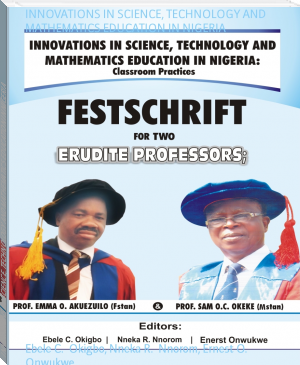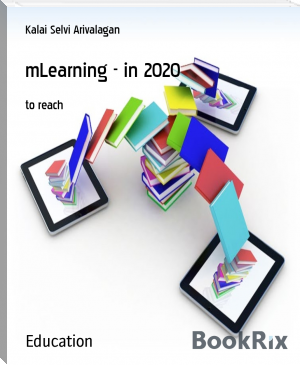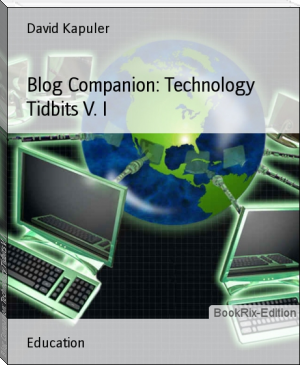INNOVATIONS IN SCIENCE, TECHNOLOGY AND MATHEMATICS EDUCATION IN NIGERIA - Ebele C. Okigbo, Nneka R. Nnorom, Ernest O. Onwukwe (best novel books to read TXT) 📗

- Author: Ebele C. Okigbo, Nneka R. Nnorom, Ernest O. Onwukwe
Book online «INNOVATIONS IN SCIENCE, TECHNOLOGY AND MATHEMATICS EDUCATION IN NIGERIA - Ebele C. Okigbo, Nneka R. Nnorom, Ernest O. Onwukwe (best novel books to read TXT) 📗». Author Ebele C. Okigbo, Nneka R. Nnorom, Ernest O. Onwukwe
Prof. J.N. Okoli is a Professor of Biology Education, Science Education, NAU Awka, Anambra State, Nigeria. She is colleagues of our erudite professors.
Chris O. Obialor A Post graduate student and lecturer of Science Education Department, NAU, Awka, Anambra State, Nigeria. He is one of the academic offspring of our erudite professors.
Gloria O. Ezeobi A Post graduate student and lecturer of Science Education Department, NAU, Awka, Anambra State, Nigeria. He is one of the academic offspring of our erudite professors.
Gertrude C. Ezenwabuchili a Post graduate student of Science Education Department, NAU, Awka, Anambra State, Nigeria. He is one of the academic offspring of our erudite professors.
Madeleine Chinyere Nwankwo an academic off spring of our erudite professors, Ph.D holder of Physics Education and colleagues of our erudite professors of Science Education Department NAU, Awka, Anambra State, Nigeria.
Anthonia Ijeoma Amaefuna is a lecturer at Science Education Department, NAU, Awka, Anambra State, Nigeria. She is one of the academic offspring of our erudite professors.
Anthonia Ngozi Ngwu a Post graduate student of Science Education Department, NAU, Awka, Anambra State, Nigeria. She is one of the academic offspring of our erudite professors.
Amarachukwu Nkechi Nwoye is Ph.D holder of Physics Education, Science Education NAU Awka, Anambra State, Nigeria. She is a senior lecture at Science Education Department, NAU, Awka, Anambra State, Nigeria. She is one of the academic offspring of our erudite professors.
Marcellinus C. Anaekwe is Ph.D holder of Chemistry Education, Science Education and a lecturer at National Open University of Nigeria.
Jacintha Ndidi Ugbaja is a Post graduate student, Chief Lecturer of Biology Education, Federal College of Education (Technical) Umunze, Anambra State, Nigeria. She is one of the academic offspring of our erudite professors.
Roseline Nkemdilim Egbunonu is Ph.D holder of Biology Education, Chief lecturer of Biology Education, Federal College of Education (Technical) Umunze, Anambra State, Nigeria. She is one of the academic off spring of our erudite professors.
N.N.C. Samuel is Ph.D holder of Chemistry Education and a lecturer in Science Education Department NAU Awka, Anambra State, Nigeria. She is one of the academic offspring of our erudite professors
Blessing Ijioma A Professor of Biology Education and immediate past provost of Alvan Ikoku Federal College of Education, Owerri, Imo State, Nigeria.
Chibuike Nwachukwu Chief Lecturer of Biology Education, Alvan Ikoku Federal College of Education, Owerri, Imo State, Nigeria.
Sylvester Ozioko Current Head of Department of Integrated Science and lecturer, Alvan Ikoku Federal College of Education, Owerri, Imo State, Nigeria.
Ahmed Wudil Aminu Chief Lecturer of Biology Education, Federal College of Education (Technical) Bichi, Kano State.
Adamu Rabiu Principal Lecturer of Biology Education, Federal College of Education (Technical) Bichi, Kano State.
Chidebe C. Uwaleke is a post graduate student at NAU, Awka and Lecturer of Chemistry Education, Alex Ekweme University, Ebonyi State, Nigeria.
Ukah, Victor Ifeanyichukwu Lecturer at the Department of Science Laboratory Technology, Federal College of Agriculture, Ishiagu. Ebonyi State, Nigeria.
Oluchi Esther-Jane Uwaleke a Post graduate student of Science Education Department, Nnamdi Azikiwe University, Awka, Anambra State, Nigeria. She is one of the academic offspring of our erudite professors.
Carol Ifeoma Nkanyimo is Ph.D holder of Mathematics Education and a lecturer at Department of Science Education NAU, Awka, Anambra State, Nigeria. She is one of the academic offspring of our erudite professors.
U.J. Obidiegwu is Professor of Adult and Continuing Education. She is a colleague of our erudite professors.
V.O. Igwe Lecturer of Adult and Continuing Education. He is a colleague of our erudite professors.
U.G.A. Okeke Chief lecturer of Biology Education, Federal Polytechnic Oko, Anambra State, Nigeria. She is also one of the academic offspring of our erudite professors.
John I. Abayomi is academic grand offspring of Prof. Emma Akuezuilo through the offspring of U.G.A. Okeke.
Cynthia C. Uwakwe is academic grand offspring of Prof. Emma Akuezuilo through the offspring of U.G.A. Okeke.
Chinenye D. Eje is academic grand offspring of Prof. Emma Akuezuilo through the offspring of U.G.A. Okeke.
Juliana Azuka, Akuezuilo is Ph.D holder of Guidance and Councelling, NAU Awka, Anambra State, Nigeria.
Uju Christiana Nwanna Lecturer of Guidance and Councelling, Nnamdi Azikiwe University Awka, Anambra State, Nigeria.
Chika Cordelia Menkiti A senior lecturer of Mathematics Education Department, Nwafor Orizu College of Education Nsugbe Anambra State, Nigeria.
Philomina Onwuka A senior lecturer of Mathematics Education Department, College of Education Agbor, Delta State, Nigeria.
Christian U. Ezenduka is Ph.D holder of Biology Education, Principal Lecturer of Biology Education, Nwafor Orizu College of Education, Nsugbe, Anambra State, Nigeria. She is one of the academic offspring of our erudite professors.
Jane N. Achufusi is Ph.D holder of Biology Education, Principal Lecturer of Biology Education, Nwafor Orizu College of Education, Nsugbe, Anambra State, Nigeria.
DEDICATION
This book is dedicated to;
Professor Emma O. Akuezuilo and Professor Sam O.C. Okeke
SECTION ONE
PEDAGOGY, GENDER AND STUDENTS’ ACHIEVEMENT IN SCIENCE, TECHNOLOGY AND MATHEMATICS EDUCATION
EFFECT OF SCIENCE HEURISTIC ON COLLEGE OF EDUCATION CHEMISTRY STUDENTS’ ACHIEVEMENT IN REDOX REACTIONS
PROF. E.O. Akuezuilo
&
Dr. J.C. Madichie
Abstract
The study focused on the effect of science writing Heuristic (SWH) on College of Education Chemistry students achievement in redox reactions. Two research questions and two hypothesis guided the study. The study utilized a quasi-experimental design having non-equivalent control group with a 2x2 factional design. The sample comprised one hundred and twenty-five second year chemistry students in two Colleges of Education in Anambra State. The instrument for data collection was the Achievement Test on Redox reactions (ATORR), and its reliability was established using Kinder Richardson formula 21(K-R 21). Mean and standard deviations were used to answer the research questions while the Analysis of covariance (ANCOVA) was used to test the null hypothesis at P< 0.05. The findings showed that the Science Writing Heuristic was effective in enhancing achievement in Chemistry. The study recommended that teachers use the science writing heuristic which is a student centred inquiry laboratory instructional approach.
Keywords: science writing heuristic, conventional laboratory instruction, achievement, redox reactions.
Introduction
Science educators have continued to stress the need for teaching methods in science that will result in meaningful learning. These methods emphasize the importance of laboratories for science teaching to inculcate the skills of science. Science is concerned with explaining nature and the explanations must be tested by controlled research investigations that are referred to as experiments.
In many Nigerian schools, science teachers still rely heavily on the traditional approach to science teaching (Adesoji, 2008; Ajaja, 2009; Ajeyalemi, 2011).The science laboratory is a critical component of the learning process. Science teachers and students world over know that practical work is a very essential component of science teaching yet the teachers largely use the expository method. The major factors that lead teachers to adopt the expository method in preference to laboratory work include lack of confidence in handling science equipment and apparatus, lack of adequate professional preparation during the pre-service years, and lack of technical know-how on improvisation of science equipment (Adesoji and Arowosegbe, 2004; Ajeyalemi 2011).
Science education researches have been conducted on what students gain from science laboratory experiences. One consistent finding according to Greenbowe and Hand (2006) is that if traditional laboratory experiments are used with the traditional laboratory notebook format, students may learn some laboratory techniques but they learn little else. In traditional laboratory experiment students are expected to blindly accept the information they are given without questioning the instructor. Also under these conditions, students develop a poor attitude towards science and consider the laboratory activity a huge waste of time. Students often view the data collected during a laboratory experiment as artificial. Using a traditional laboratory experiment, students will blindly follow the directions.
Ajeyalemi (2011) observed that the salient aims and objectives of laboratory practical work are not being achieved in the Nigerian school system. This, he said, may be due to the poor learning environment and the fact that teachers have remained inflexible in their methods of teaching.
Redox reaction in Chemistry is one of the most difficult topics to teach and to learn
(Njoku 2004;Ojokuku and Amadi 2010; Obomona & Ekenobi 2011; Udo 2011).Students show difficulties in learning redox reactions. Redox reactions are described as one of the three most common (precipitation, acid-base and oxidation and reduction (redox)) reaction processes and perhaps the most important of these three, because redox reactions explain an amazing variety of chemical reactions (Osterlund 2010).
A heuristic tool for learning from laboratory activities in science is the Science Writing Heuristic (SWH).The science writing heuristic (SWH) can be understood as an instructional approach that has been devised to encourage students to use hands- on guided inquiry laboratory activities and collaborative group work to actively negotiate meaning and construct conceptual knowledge,(Burke,Greenbowe & Hand 2005). It can also be understood as an alternative format student’s use for their laboratory reports, and a teaching technique used by the instructor to help format the flow of activities associated with the experiment (Greenbowe and Hand, 2006).
The science writing heuristic provides learners with a heuristic template to guide science activity and reasoning in writing. Further it provides learners with a template of suggested strategies to enhance learning from laboratory activities. Students can use this template in both writing their laboratory reports or participating in the classroom or laboratory activities.
Statement of the Problem
A significant challenge in science education is how to move students from thinking that science facts are to be memorized toward a deeper understanding of concepts and scientific ways of thinking. The objectives of the chemistry programme at the NCE level are to produce highly qualified middle-level manpower knowledgeable in the processes of chemistry and capable of inculcating these in the students. The basic science and technology curriculum is very practical in nature and should ideally be taught through methods that maximize the active participation of the learner (Akuezuilo 2007).
Despite the importance placed on laboratory work in chemistry curricula, there have been few research studies showing that traditional laboratory experiments are an effective tool for promoting understanding of chemistry (Greenbowe and Hand 2006). However, laboratory activities that are inquiry based have been reported to have potential for improving pedagogical value of laboratory work. Research has shown that a heuristic tool known as the science writing heuristic SWH facilitated students to generate meaning from data, make connections among procedures, data, evidence and claims and engage in metacognition (Keys, Hand, Prain& Collins, 1999; Caukin, 2010; Arnold, 2011). The problem of the study is poor student understanding and achievement in redox reactions and the effect of the SWH approach on NCE chemistry students’ achievement in redox reactions when compared to the conventional laboratory instruction?
Purpose of the Study
The main purpose of this study is to ascertain the effect of the Science Writing Heuristic (SWH) on NCE chemistry students’ achievement in redox reactions. Specifically the study sought to:
Compare the effect of the SWH and conventional laboratory instructional modes on NCE chemistry students’ achievement in redox reactions.
Determine the effect of the SWH and conventional laboratory instructional modes on the achievement of male and female NCE chemistry students in redox reactions.
Research Questions
What are the mean achievement scores of NCE chemistry students taught redox reactions using SWH and conventional laboratory instructional modes?
What are the mean achievement scores of male and female NCE chemistry students taught redox reactions using SWH and conventional laboratory instructional modes?
Hypotheses
Two (2) Null hypotheses were formulated to guide this study. The null hypotheses were tested at the 0.05 level of significance.
There is no significant difference in the mean achievement scores of NCE chemistry students taught redox reactions using SWH and conventional laboratory instructional modes.
There is no significant difference in the mean achievement scores of male and female NCE chemistry students taught redox reactions using SWH and conventional laboratory instructional modes.
Design of the Study
To address the research questions and hypotheses stated in this study, a quasi-experimental research design was used. A quasi-experimental design was chosen because it is used to estimate the causal impact of an intervention on its target population. Quasi experimental studies are experimental studies except that random assignment played no role in determining which subject got which level of treatment, (Mitchell &Jolley 1988).
Table I: Experimental Design
Group
Pre-test
Treatment
Post-test
Experimental Gr 1
Control Gr 2
Where (Pre-test) = O2 (Post-test)
X1 = SWH treatment
X2 =Conventional laboratory treatment
Area





Comments (0)